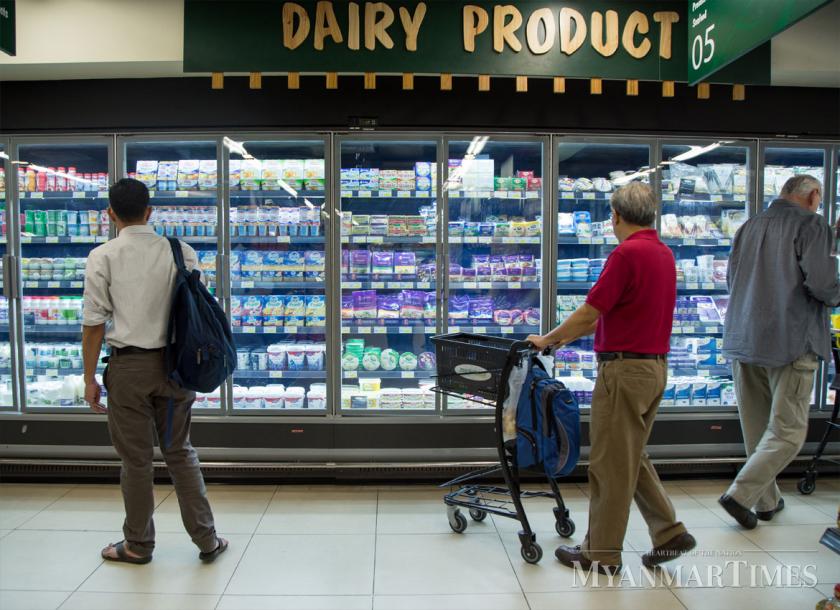Three Japanese companies and a Swiss trading house are authorized to operate both wholesale and retail business as a 100 percent foreign owned business in Myanmar
10 เมษายน 2562
Three Japanese companies and a Swiss trading house have become the first foreign entities authorised to do retail and/ or wholesale business in Myanmar.
Toyota Group's trading arm Toyota Tsusho, pharmaceutical firm Otsuka and diaper manufacturer Mycare Unicharm are authorised to operate wholesale business as a 100% foreign-owned business, according to an announcement from the commerce ministry. Zurich-headquartered DKSH is permitted to do both retail and wholesale activities as a foreign company.
The trading licences were issued by the commerce ministry in accordance with Directive 25/2018 last May, said lawyer Bob Tseng from Thanlwin Legal.
In total, 11 entities - including three joint ventures and four local companies - have received the licences. The joint ventures are Pacific Andaman (SEA) Co, a Thai-Myanmar JV; Asahi Loi Hein, a partnership between Japanese Asahi group and local beverage maker Loi Hein; as well as Aeon Orange, which is jointly created by Chiba-headquartered retailer Aeon and Myanmar firm Creation Myanmar Group of Companies. Meanwhile, supermarket chainstore City Mart, Myanmar Agribusiness Public Co, Myanmar R F S and NCX Myanmar are the domestic companies authorised to operate.
The four foreign players and three joint ventures are the first non-Myanmar companies to secure a greenlight from the authorities since the government moved to partially open up the retail and wholesale market two years ago. The Myanmar Investment Commission issued the List of Restricted Activities No. 15/2017 in April 2017, which allowed foreign businesses to invest in retail and wholesale without restriction. It then took the commerce ministry over one year to follow up with a Directive.
A US Department of Commerce report published in July 2017 estimated Myanmar’s retail industry to be valued at US$10-12 billion, or roughly 15pc of the GDP, with strong short and medium-term growth projections.
Despite the liberalisation, there remains substantial capital requirement and restrictions on retail size for foreign players. Non-Myanmar companies and JVs are not allowed to operate mini-markets, convenience stores or any retail distribution where the floor area is smaller than 929m2. Foreign investments are also required to have $5 million and $3 million paid-up capital in wholesale and retail respectively. For joint ventures where the local investor has at least a 20pc equity ratio, the initial investments necessary for retail and wholesale are, respectively, $700,000 and $2 million.
These companies are now required to remit the minimum investment required, according to Alexander Bohusch of Luther Law Firm, which is involved in wholesale and retail trading licence applications.
“For example, a company not previously allowed to trade has to remit 50pc of the minimum investment within 30 days from the approval of the licence application. The remainder has to be remitted in the second and third year of operations," he said.
In addition, these companies need to obtain import licences necessary for the goods they want to bring in, two sources involved in trading told The Myanmar Times. The wholesale licence is “a starting point” and there should be no further limits or “bureaucratic obstacles” on what companies can import beyond the wholesale licences, one of them added. Rumours that the government would further restrict the activities of foreign investors were denied by the trade authorities.
“Despite the higher capital requirements imposed for fully foreign-owned companies, and along with other conditions, this has significantly changed the previously common adopted structure of maintaining an on-shore service/ management company and appointing local distributors to be importers,” Mr Tseng commented.
Investor interest in the industry is heating up. The Myanmar subsidiary of German retail group Metro AG last month raised a $20m loan from the International Finance Corporation to offer wholesale food service distribution for hotels, restaurants, retailers, and offices. Lottemart and E-Mart, South Korea’s two biggest retailers, are mulling plans to enter the market.
(The Myanmar Times: https://www.mmtimes.com/news/japanese-companies-dksh-enter-myanmar-wholesale-market.html )











